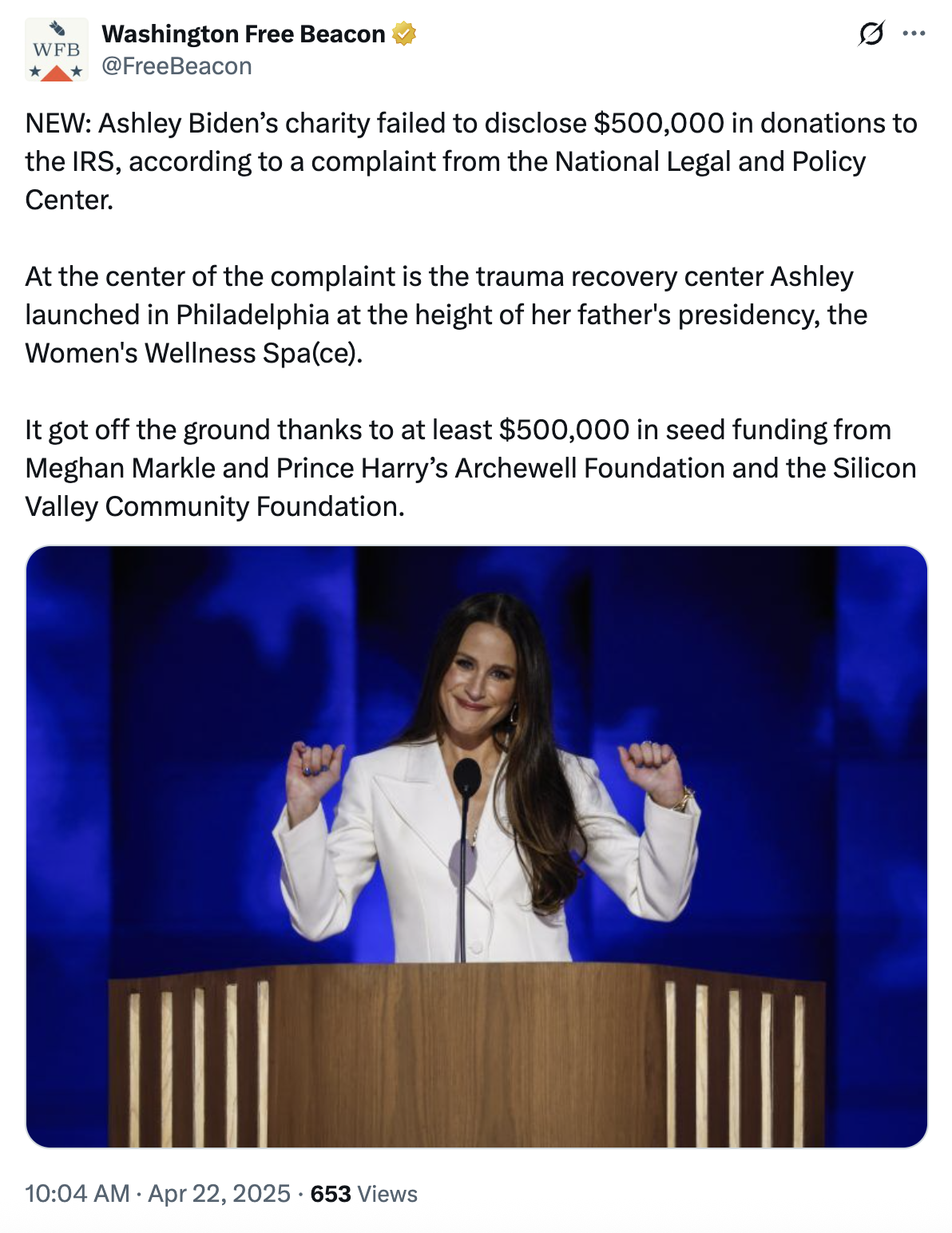Allegations of Undisclosed Donations Rock Ashley Biden’s “Women’s Wellness Spa(ce)” Charity
In recent days, the spotlight has once again turned to the Biden family—but this time, it’s not over policy disagreements or high-profile pardons. Instead, public attention has focused on Ashley Biden, the president’s daughter, and her nonprofit organization, Women’s Wellness Spa(ce). A conservative watchdog group has filed a formal complaint with the Internal Revenue Service (IRS), alleging that the charity failed to report $500,000 in grant funding on its 2023 tax filings. If the claims prove accurate, the organization may face significant penalties—and Ashley Biden’s reputation for philanthropic work may suffer lasting damage.
1. The Genesis of Women’s Wellness Spa(ce)
Following her father’s inauguration, Ashley Biden leveraged her background in social work to launch a walk-in “trauma recovery center” in Philadelphia. Officially incorporated in early 2023, Women’s Wellness Spa(ce) aims to provide accessible mental-health services for women grappling with stress, anxiety, and the lingering effects of trauma. Housed in a renovated storefront near Center City, the center offers group therapy, art-and-music–based workshops, and brief individual counseling sessions—free of charge.
Key supporters helped secure an initial $500,000 in operating capital, including:
-
Archewell Foundation, co-founded by Prince Harry and Meghan Markle.
-
Silicon Valley Community Foundation, a major philanthropic intermediary for tech-sector donations.
-
Several private donors from the health and wellness community, according to local press reports.
That half-million–dollar investment was lauded at the time as a model of cross-sector collaboration: Hollywood royalty, tech philanthropists, and the First Family’s next generation uniting to address a pressing public‐health issue. Yet, less than one year later, the very scale of that initial funding now sits at the center of an IRS compliance storm.
2. Nonprofit Tax Reporting 101: Form 990 and Accrual Accounting
All U.S. nonprofits with annual gross receipts exceeding $200,000—or total assets over $500,000—must file IRS Form 990. This document, publicly accessible, discloses:
-
Total revenues (contributions, grants, program service fees).
-
Major donors (those contributing $5,000 or more).
-
Executive compensation and governance practices.
-
Expenses and program-service achievements.
Critically, charities may choose between cash-basis and accrual accounting:
-
Cash‐basis recognizes revenue when funds are received and expenses when paid.
-
Accrual‐basis records revenues when earned (i.e., when an obligating event occurs) and expenses when incurred—regardless of cash flow.
For organizations employing accrual accounting—as Women’s Wellness Spa(ce) reportedly does—grant receipts must appear on the Form 990 for the year in which the funds were actually received or contractually committed, regardless of when payments clear the bank.

3. The NLPC Complaint: Discrepancies in Reported Grants
On Monday, the National Legal and Policy Center (NLPC)—a conservative government‐ethics watchdog—released a letter formally requesting an IRS inquiry. The NLPC’s analysis highlights a glaring gap:
| Source Organization | Reported Grant (IRS Form 990) |
|---|---|
| Archewell Foundation | $250,000 |
| Silicon Valley Community Foundation | $250,000 |
| Total Expected | $500,000 |
| Women’s Wellness Spa(ce) | $170,296 |
| Weighted per‐donor threshold | No single gift over $5,000 listed |
Despite two third‐party nonprofits listing equal $250,000 contributions in their own 2023 filings, Women’s Wellness Spa(ce) declared only $170,296 in aggregate gifts—and failed to identify any individual gift exceeding $5,000. NLPC attorney Paul Kamenar asserts this pattern suggests intentional underreporting:
“Ashley Biden’s failure to disclose receiving $500,000 in grants in 2023 raises the question of what other contributions she is hiding.”
The NLPC letter urges the IRS to investigate whether additional funding went unreported—and, if so, to impose appropriate sanctions under the Internal Revenue Code, which can include monetary penalties or—even in rare cases—revocation of tax‐exempt status.
4. Women’s Wellness Spa(ce) Responds: Defending the Figures
In response to inquiries, the charity’s accountant, Greg Mangasarian, issued a detailed statement:
“Women’s Wellness Spa(ce) received $150,000 in 2023, and will report the balance of the multi‐year pledges in our 2024 Form 990. Our organization employs the accrual method of accounting, which requires that grants be recorded when the donor’s obligation is confirmed—not when funds are distributed in full.”
Under this explanation:
-
$150,000 reflects the portion of pledges actually received by December 31, 2023.
-
$350,000 remains outstanding, to be recognized in the subsequent year’s tax return once disbursement conditions are met.
Mangasarian emphasized that an accrual approach aligns with Generally Accepted Accounting Principles (GAAP) and provides a more accurate representation of an organization’s financial commitments. Nonetheless, the NLPC’s counsel argues that accrual accounting does not excuse omitting unambiguous, legally binding grant agreements—particularly when those grants have formal payment schedules and reporting requirements.
5. Presidential Pardons and the Biden Family’s Tax Controversies
The current scrutiny of Ashley Biden’s charity emerges against a backdrop of high‐profile tax controversies involving other Biden relatives:
-
Hunter Biden, the President’s son, faced federal tax‐fraud charges for allegedly failing to report millions in income from foreign consulting arrangements. In a contentious move, President Biden issued Hunter a full and unconditional pardon in late 2024, eliminating any criminal liability dating back 11 years.
-
James Biden, the President’s brother, and spouse Sarah Biden were indicted alongside Hunter on charges related to money laundering and illegal lobbying. James also received a presidential pardon, whereas Sarah’s case remains in plea‐negotiation limbo.
Legal observers have noted that no family member other than Ashley remains under direct criminal investigation. Yet, public‐perception risks abound: some commentators argue that pardoning one family member but not another suggests political calculus rather than impartial justice administration.
6. IRS Enforcement and Potential Penalties
Should the IRS conclude that Women’s Wellness Spa(ce) deliberately misrepresented its 2023 revenues, the charity could face:
-
Excise Taxes: Up to 10% of undisclosed contributions, levied on the organization or responsible officers.
-
Form 990 Penalties: An initial fine of $20 per day (capped at $10,000) for failure to complete and file an accurate return.
-
Loss of Tax-Exempt Status: In extreme cases—typically linked to fraud—the IRS may revoke 501(c)(3) status, forcing the charity to pay corporate income tax on its revenues.
Additionally, if federal investigators find evidence of intentional wrongdoing, state authorities in Pennsylvania could pursue charges for perjury (signing a false tax document) or corporate fraud under the state criminal code.
7. Best Practices in Nonprofit Financial Transparency
7.1 Accurate Grant Recognition
Nonprofit governance experts stress that organizations must:
-
Maintain Written Agreements: Document grant terms—payment schedules, reporting conditions—and record obligations promptly.
-
Disclose Large Donors: Identify any contributor whose gift exceeds the IRS’s $5,000 threshold, including in‐kind and multi‐year pledges.
-
Follow GAAP Consistently: Whether using cash or accrual accounting, apply the chosen method uniformly and transparently.
7.2 Board Oversight and Audit Controls
A charity’s board of directors bears nonprofit fiduciary responsibilities:
-
Regular Financial Reviews: Audited financial statements and independent examinations minimize reporting errors and deter misconduct.
-
Conflict-of-Interest Policies: Board members, especially those related to high-profile figures, must recuse themselves from decisions involving family donations.
-
Whistleblower Mechanisms: Confidential reporting channels help uncover anomalies before they become public scandals.
Any lapse in governance can rapidly erode donor confidence—particularly when prominent personalities are involved.
8. Political and Public-Relations Implications
For the Biden White House, managing this emerging controversy presents a delicate balancing act:
-
Upholding Nonprofit Integrity: Demonstrating that tax laws apply equally to every American, even the First Family’s offspring.
-
Avoiding Perception of Special Rules: Steering clear of any impression that Ashley Biden is shielded from scrutiny—a charge already leveled at Hunter and James.
-
Protecting Mental-Health Mission: Ensuring that donors and clients alike continue to trust Women’s Wellness Spa(ce) as a vital community resource.
Media coverage has thus far been bipartisan, with conservative outlets emphasizing alleged impropriety, while liberal publications question the NLPC’s motives and highlight the importance of mental-health services. The next phase—IRS response and any potential audit—will likely shape public opinion more decisively than editorial arguments.
9. Looking Ahead: Monitoring IRS Action and Annual Filings
The IRS typically initiates examinations of nonprofit Form 990 filings within three years of submission. If the agency opens an inquiry into Women’s Wellness Spa(ce), it may request:
-
Grant Agreements and Correspondence: Demonstrating the binding nature of multi-year pledges.
-
Bank Statements and Disbursement Records: Corroborating actual cash receipts versus recorded revenue.
-
Board Minutes and Financial Policies: Verifying adherence to internal controls and accounting standards.
Should the charity’s 2023 return undergo significant revisions—or if penalties are levied—its 2024 Form 990 (filed in mid‐2025) will require careful attention. Legal and financial advisors recommend voluntary disclosure of any corrected figures to mitigate further sanctions and restore donor confidence.
10. Conclusion: Transparency as the Path to Trust
The complaint against Ashley Biden’s Women’s Wellness Spa(ce) spotlights the critical importance of transparent financial reporting in the nonprofit sector—especially when high‐profile names are involved. While accrual accounting offers a legitimate framework for recognizing multi-year grants, the organization must ensure that its public disclosures precisely reflect legal obligations and avoid any appearance of concealment.
For Ashley Biden, the stakes extend beyond potential IRS penalties. As the mental‐health nonprofit community watches closely, Women’s Wellness Spa(ce) has an opportunity to reaffirm its commitment to both its social mission and rigorous governance. In an era where public trust in institutions is fragile, timely, accurate disclosures—and proactive engagement with regulators—remain the surest route to preserving credibility and fulfilling the organization’s vital work.

Adrian Hawthorne is a celebrated author and dedicated archivist who finds inspiration in the hidden stories of the past. Educated at Oxford, he now works at the National Archives, where preserving history fuels his evocative writing. Balancing archival precision with creative storytelling, Adrian founded the Hawthorne Institute of Literary Arts to mentor emerging writers and honor the timeless art of narrative.
